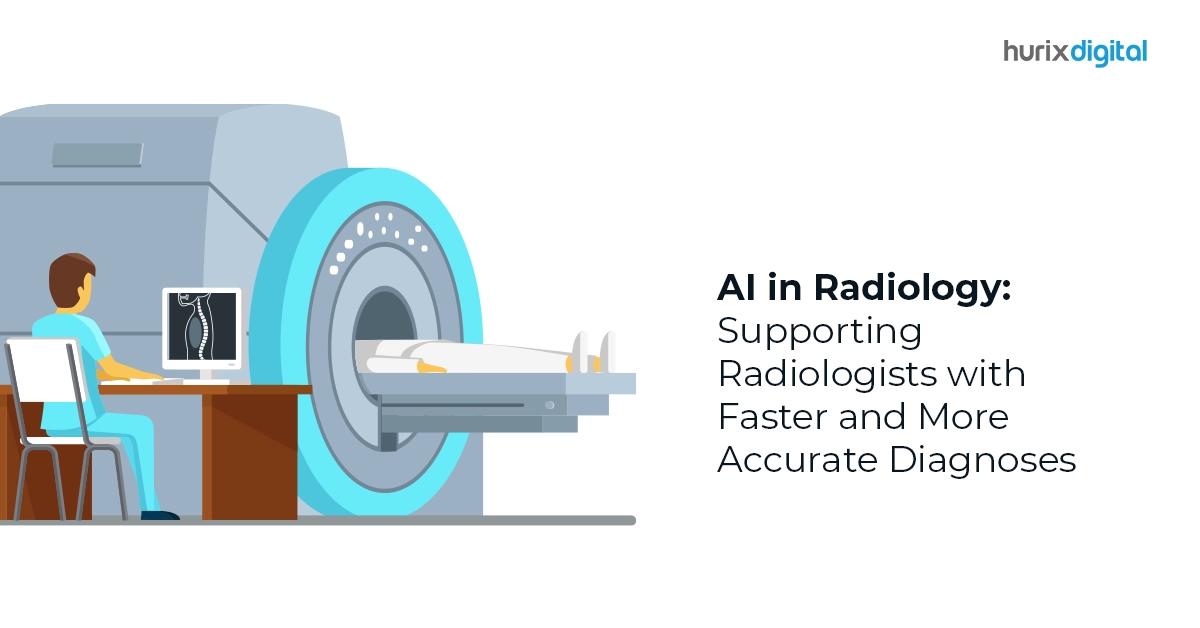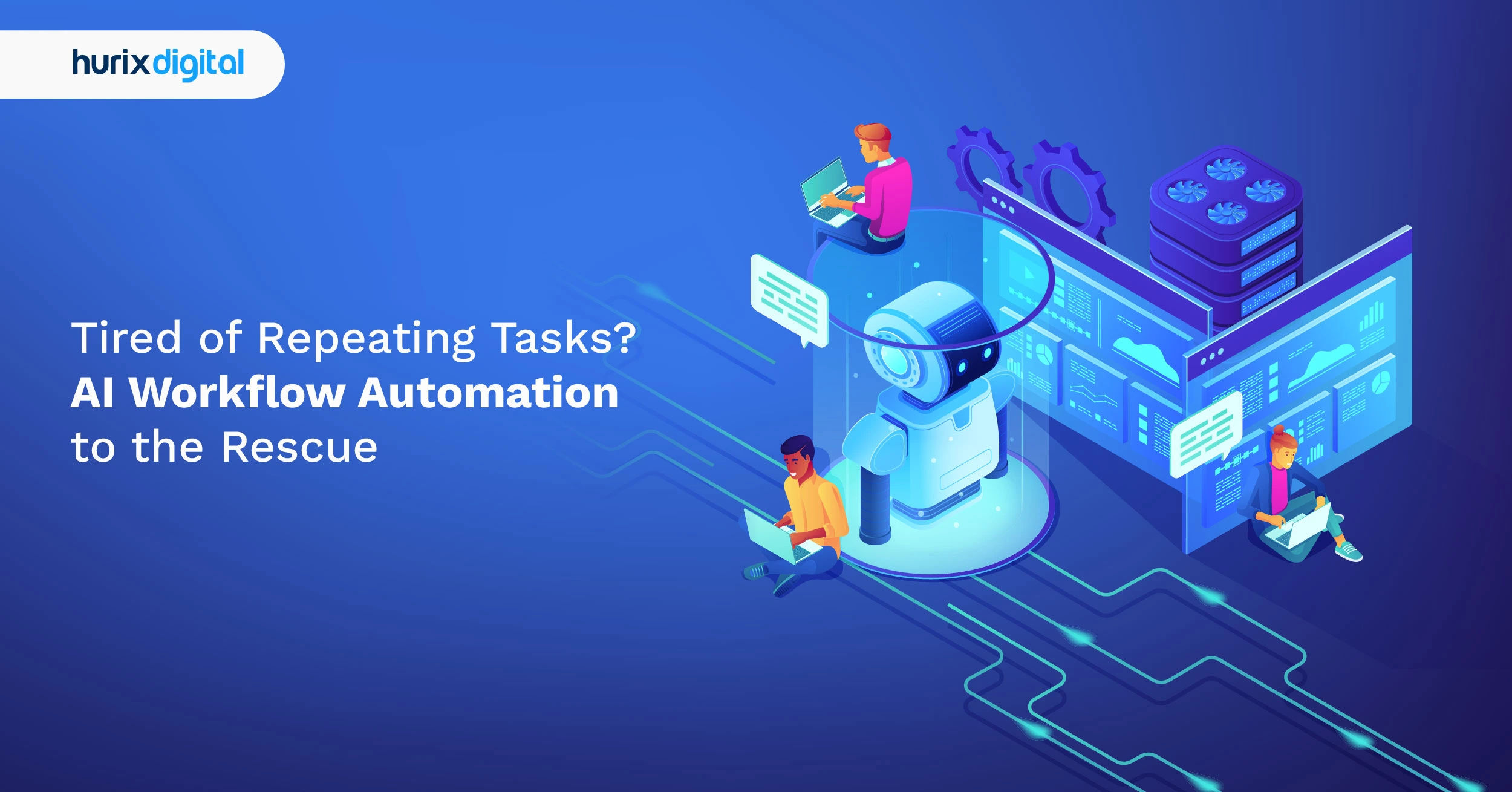
Tired of Repeating Tasks? AI Workflow Automation to the Rescue
Summarize with:
The burden of manual tasks in business workflows was recognized long before the era of digital transformation we see today. Businesses have always been aware that repetitive manual tasks are time-consuming, can often be demotivating, and lead to a lot of human error.
These errors can significantly affect a business’s bottom line, and the manual work also results in employees spending time on less profitable operations. However, ever since the dawn of digital transformation, and more so since the increased use of AI, businesses have been looking for ways to reduce costs and maximize efficiency.
Enter AI workflow automation. This is a process of automating various operations in a business workflow to ensure greater efficiency and maximize profits.
According to a study by PwC, artificial intelligence is expected to contribute up to $15.7 trillion to the global economy by 2030, more than China and India combined. Further, according to a report by Semrush, AI growth will increase by 33.2% annually between 2020 and 2027.
If you are looking to make use of AI in business through workflow automation tools and want to know what benefits they offer, this guide will show you how it can transform your business altogether and set it on the path to greater success.
Table of Contents:
- What is AI-Powered Workflow Automation?
- Why Does AI-Powered Workflow Automation Matter for Business Processes?
- How AI-Powered Workflow Automation Works?
- The Benefits of AI Workflow Automation
- How to Implement AI-Powered Workflow Automation in Your Business?
- In Conclusion
What is AI-Powered Workflow Automation?
AI workflow automation is the integration of AI technologies with workflow automation tools to automate tasks that require human intelligence, such as:
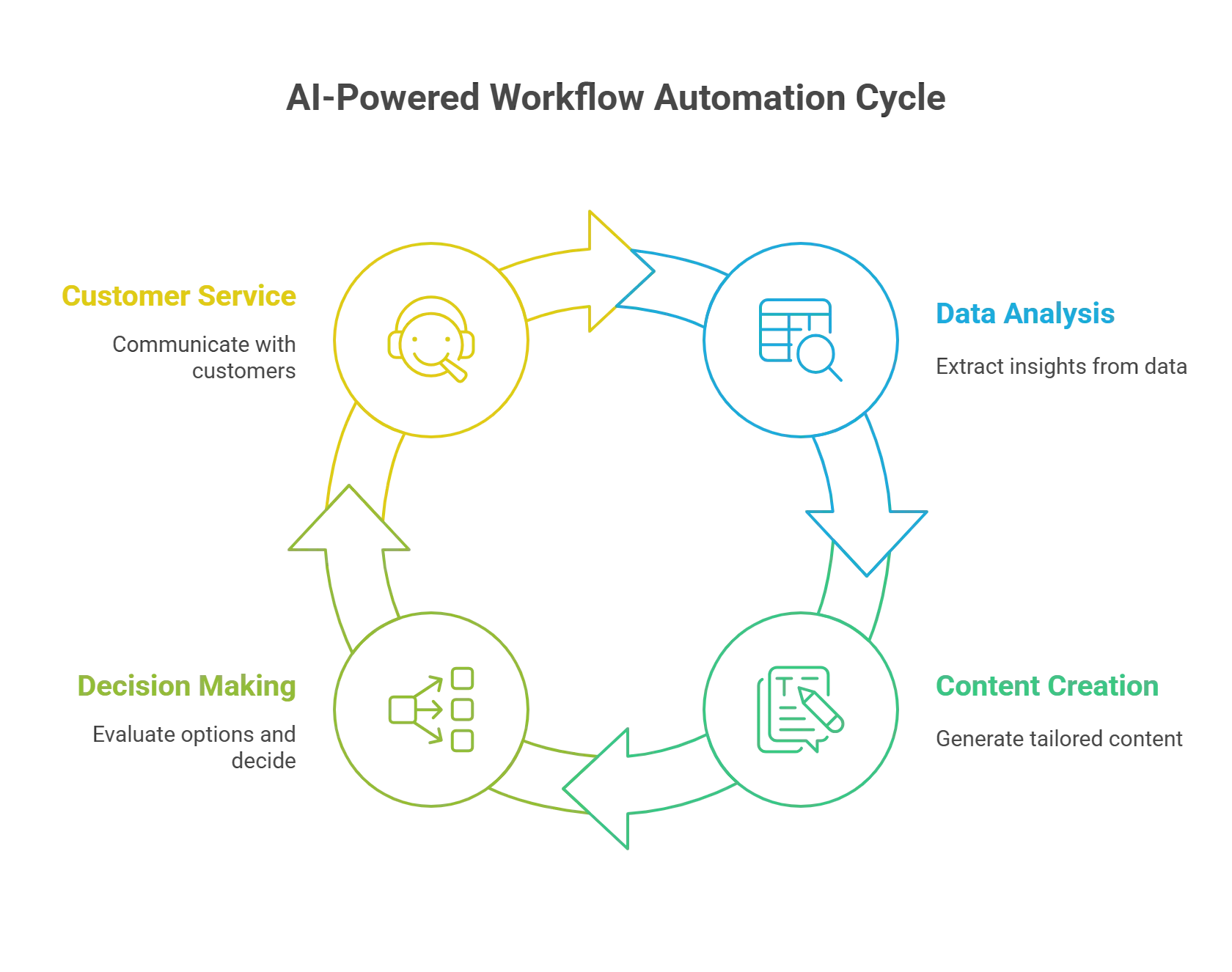
1. Data Analysis
With AI, you can extract meaningful insights, patterns, and trends from large amounts of structured and unstructured data, such as text, images, audio, and video. AI can also perform predictive analytics, allowing businesses to anticipate future outcomes and take proactive measures.
2. Content Creation
Based on data and context, AI can generate high-quality content, such as reports, articles, emails, and social media posts, that can be tailored to the audience’s tone and style preferences.
3. Decision Making
AI can evaluate multiple options and scenarios and recommend the best course of action based on the data and the goals. It can also explain the rationale behind the decisions and provide feedback and suggestions for improvement.
4. Customer Service
Using natural language, voice, or chat, AI can communicate with customers and provide them with relevant information, solutions, and suggestions. If necessary, AI can also escalate complex requests, complaints, or requests to human agents.
Why Does AI-Powered Workflow Automation Matter for Business Processes?
AI-powered workflow automation can have a significant impact on business processes by delivering the following benefits:
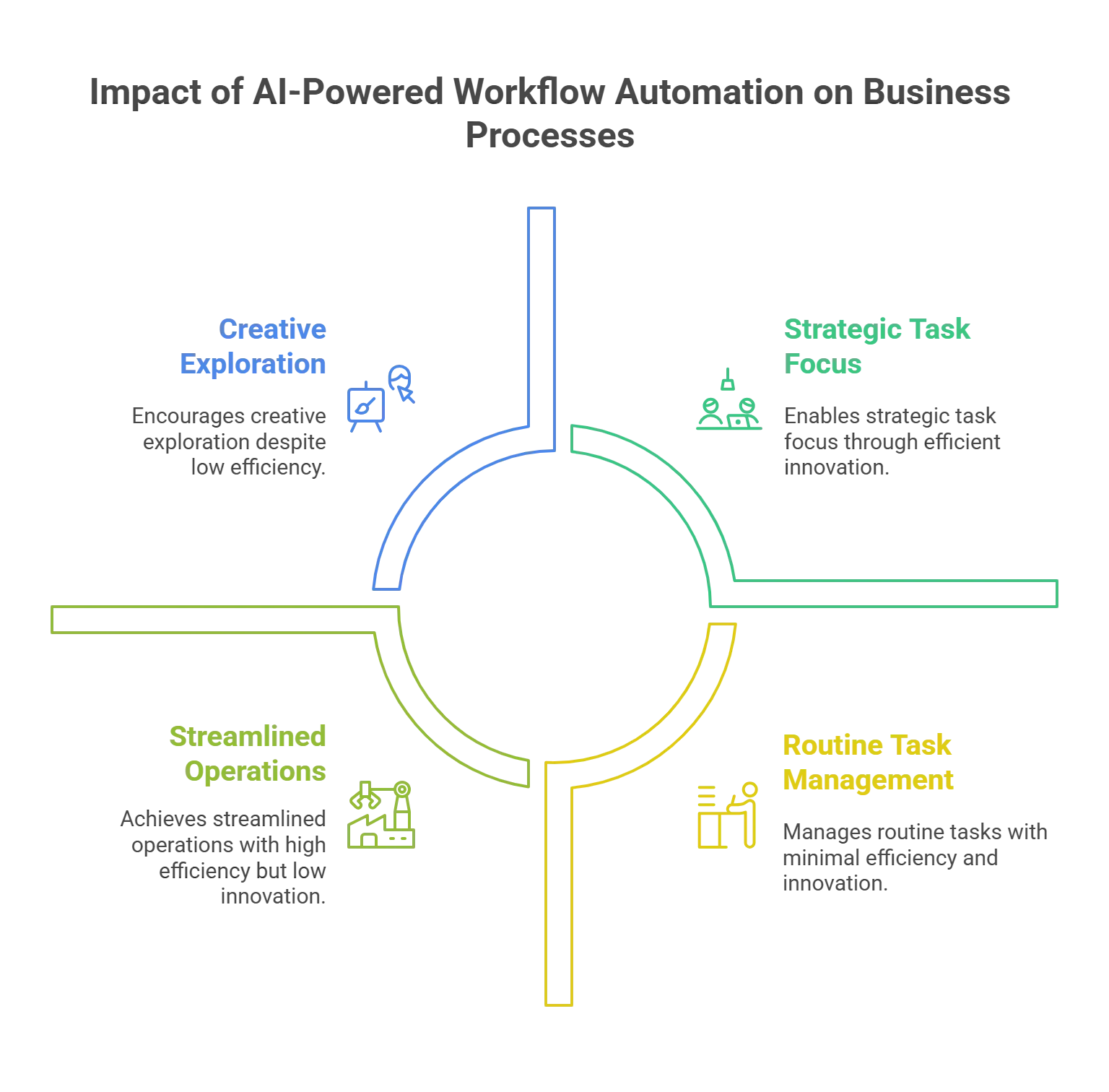
1. Efficiency
Automation of workflows with artificial intelligence can help businesses save time, money, and resources. It can also eliminate human errors, delays, and bottlenecks, improving the quality and speed of the work.
2. Productivity
Workflow automation tools can help businesses increase the output and value of their tasks and processes. They can also enable human workers to focus on more strategic, creative, or value-added tasks rather than mundane, routine, or low-value tasks.
3. Quality
With AI-powered workflow automation, companies can improve the accuracy, consistency, and reliability of their tasks and processes, as well as ensure compliance with standards, regulations, and best practices.
4. Innovation
Businesses can boost creativity, diversity, and flexibility by automating workflows and processes using AI. They can also explore new opportunities, explore new markets, and adapt to changing customer preferences, expectations, and needs.
How AI-Powered Workflow Automation Works?
AI-powered workflow automation is being used in various industries and domains, such as:
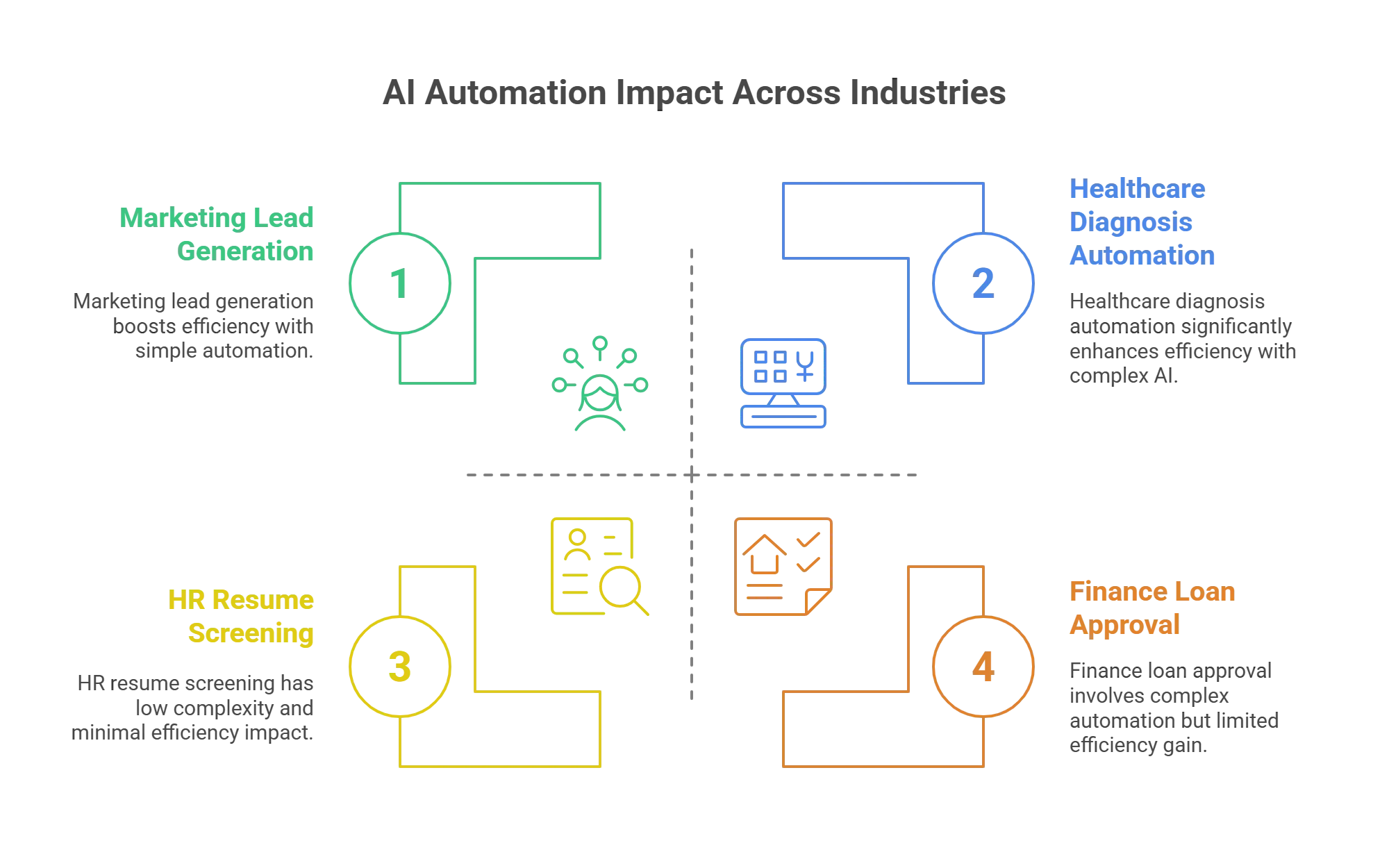
1. Healthcare
With AI-powered workflow automation, healthcare providers can improve the quality and efficiency of patient care, diagnosis, treatment, and research.
For example, cognitive automation can automate the tasks of scheduling appointments, checking eligibility, verifying insurance, processing claims, generating reports, analyzing medical images, recommending medications, and monitoring vital signs.
2. Education
AI-powered workflow automation can help educators enhance the effectiveness and accessibility of learning, teaching, and assessment. For example, educators can automate the tasks of creating personalized learning plans, generating adaptive content, providing feedback, grading assignments, detecting plagiarism, and recommending courses using these tools.
3. Finance
Automating workflows based on artificial intelligence can help financial institutions improve performance and security. Verifying identity, detecting fraud, assessing risk, approving loans, producing invoices, reconciling accounts, and providing financial advice can be automated with such a tool, for example.
4. Marketing
Marketing campaigns, content, and communication can be more effective and relevant when AI-powered workflow automation is used. An AI-powered workflow automation tool can automate tasks such as segmenting customers, generating leads, creating ads, writing emails, posting social media, and optimizing conversions.
5. Human Resources
It is possible to streamline and improve the hiring, training, and retention of employees using AI-powered workflow automation. For instance, HRs can use it to automate tasks such as screening resumes, conducting interviews, providing feedback, and creating learning paths.
The Benefits of AI Workflow Automation
In this section, we examine five key benefits of AI workflow automation for your business:
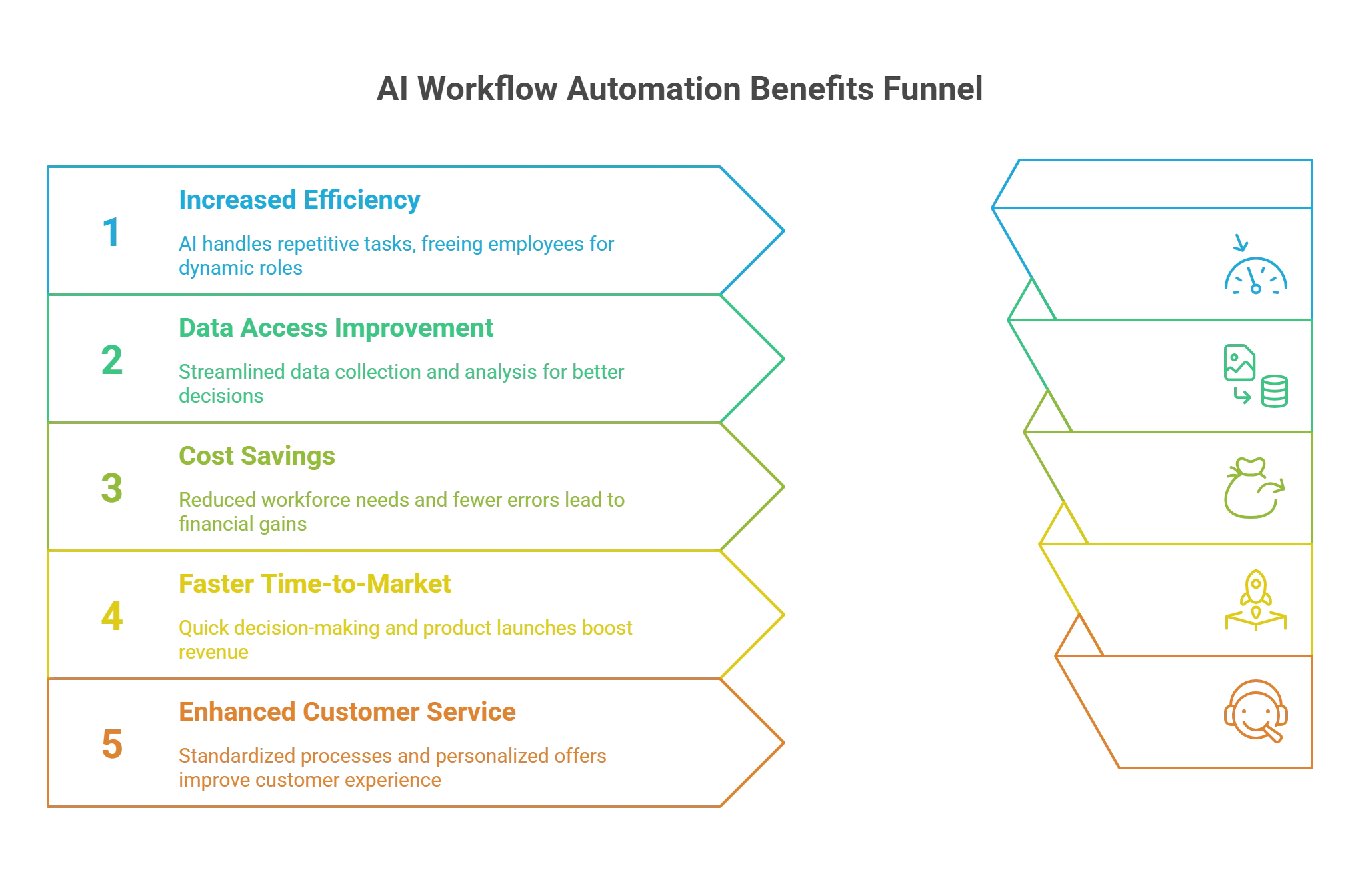
1. Greater Efficiency and Productivity
The first and most obvious benefit of incorporating AI automation in your business is that it can help run your business a lot more efficiently and increase employee productivity.
The increase in productivity comes from employees no longer having to perform the same manual, often repetitive roles that can lead to a sense of demotivation.
Instead, they can focus on more dynamic aspects of the business, which in turn can help increase employee engagement in the long run. Additionally, since AI workflows can help standardize various operations, it also leads to greater efficiency and reduces the overall complexity of these operations.
In a practical sense, imagine a company that begins using AI as the first step in its customer support operations. With AI tools able to respond to common queries and solve basic problems, customer service representatives can spend their time on more complex queries and escalations.
This, in turn, can increase their response rate and prevent delays, leading to improved customer satisfaction. In fact, for 83% of customers, good customer service can turn one-time customers into long-termers and even brand champions.
2. Offers Greater Access to Crucial Data
Data is the foundation of sound decision-making, no matter which sector you are in. However, the process of collecting and analyzing data often becomes tedious, especially when done so manually.
With data automation, the process of collecting data is streamlined and stored for later use without much human intervention and any instances of human error. This data can then be analyzed to make smarter organizational decisions that can further help improve workflows, increase profits, or even lead to better employee engagement.
It can also be labeled and classified based on the organization’s different needs, and can be deployed via Machine Learning models based on your needs.
3. Increases Cost Savings
Every business aims to reduce its overall cost of production and operation so that it can achieve higher profits. In a system that requires manual human intervention to carry out multiple operations, this is easier said than done.
However, with AI tools and process automation, businesses can eliminate the need for a major chunk of their workforce while also increasing their operational efficiency. This leads to an increase in profits as organizations can then utilize their workforce’s skills in areas with greater demand.
Additionally, another unseen means of cost saving with automation in business is that it can eliminate the chances of human error. These errors can cost businesses a lot of time and money to fix in the long run.
4. Quicker Time-To-Market
Another manner in which AI-powered workflows can help businesses accelerate their profits is by reducing the time-to-market.
This is because the use of AI automation tools can reduce the time spent on multiple operations. This enables businesses to make quicker decisions and respond to changes in the market faster.
Responding to customer queries, launching products, or improving existing products to outmaneuver their competition has many benefits, and they can help businesses maximize their revenue generation in the long run.
However, to get the most out of workflow automation, always remember that you need a dedicated IT team to help handle its technicalities. One of the biggest workflow automation mistakes organizations make is believing that anyone can operate these tools, often leading to mishaps.
5. Improved Customer Service
Standardizing processes across a business can help it offer customers a seamless experience all around.
Be it customer onboarding, the ability to enable cross-device shopping while retaining customer data, offering personalized offers to customers from time to time, or streamlining customer service. The use of AI across all these operations can significantly help improve the overall experience.
These benefits, in turn, can also help improve customer retention to ensure that you do not lose out on customers after a single purchase.
Statistics show that 61% of customers would leave a business for a competitor after just one negative experience. This shows the importance of using AI tools to leverage the many benefits they offer while reducing the chances of damaging human errors.
How to Implement AI-Powered Workflow Automation in Your Business?
AI-powered workflow automation can offer your business many benefits, but it also requires careful planning and execution. Here are some steps that you can follow to implement AI-powered workflow automation in your business:
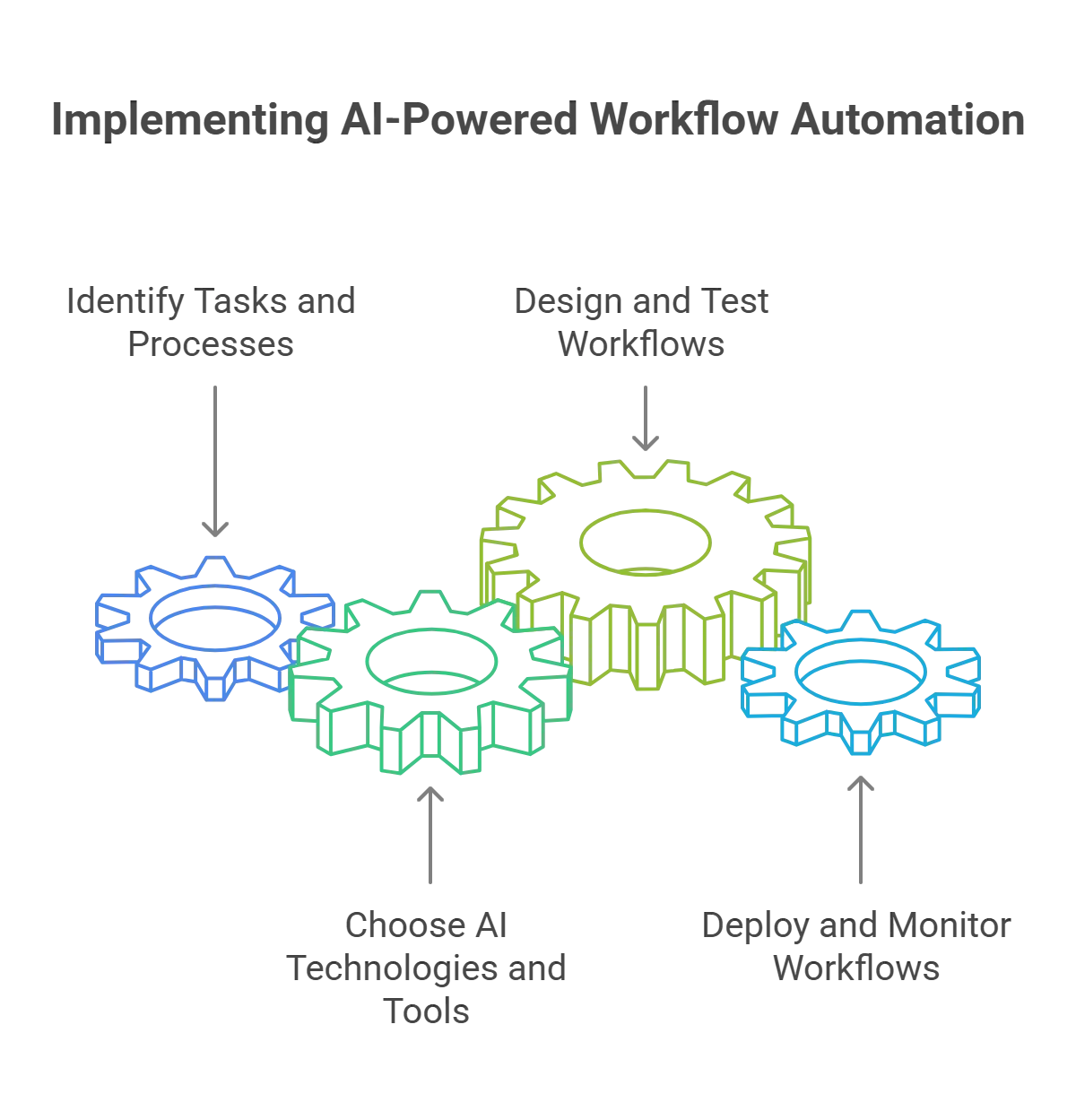
1. Identify the Tasks and Processes That Can Be Automated
Start by analyzing your current tasks and processes, identifying the ones that are repetitive, manual, rule-based, complex, dynamic, or unstructured. Additionally, you can prioritize the tasks and processes based on their impact, feasibility, and urgency.
2. Choose the Right AI Technologies and Workflow Automation Tools
You can then select the AI technologies and workflow management software that best suit your needs, goals, and budget. Also, consider the compatibility, scalability, and security of the AI technologies and workflow automation tools that you choose.
3. Design and Test the Workflows
The next step will be to create workflows that define the steps, inputs, outputs, and actors involved in the tasks and processes. You can also test the workflows to ensure that they meet the quality, efficiency, and innovation standards that you have established.
4. Deploy and Monitor the Workflows
After you deploy the workflows into your production environment, you can monitor their performance, outcomes, and feedback, as well as optimize and improve the workflows based on your insights and data.
In Conclusion
Customer service is king, and this is especially true when the market is flooded with countless options. In this scenario, businesses must ensure they provide their customers with the best possible experience from the very beginning.
However, this can be rather challenging when businesses rely on human effort to perform the bulk of their operations, leading to delays, costly errors, and employee demotivation.
On the other hand, making use of AI workflow automation can help streamline various operations and help businesses improve efficiency, make better use of their human capital, save costs, and outperform their competitors.
We hope you found this guide on the various benefits of AI helpful. Its ability to improve customer service and make your business a lot more successful must not be ignored.
If you are convinced and are looking for the best tailor-made software to streamline your business, make sure to check out Hurix Digital.
Contact our experts to understand your needs better and implement the best technologies to serve your business more effectively.
Summarize with:

Vice President & SBU Head –
Delivery at Hurix Technology, based in Mumbai. With extensive experience leading delivery and technology teams, he excels at scaling operations, optimizing workflows, and ensuring top-tier service quality. Ravi drives cross-functional collaboration to deliver robust digital learning solutions and client satisfaction
 A Space for Thoughtful
A Space for Thoughtful 



